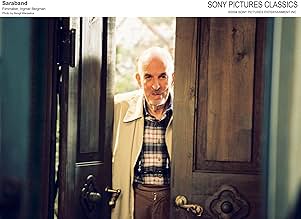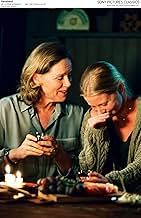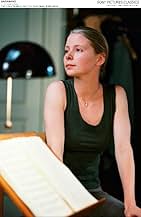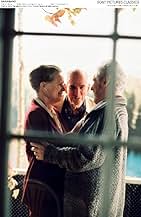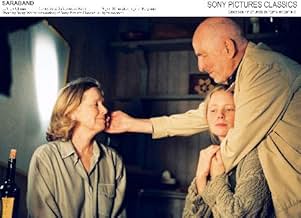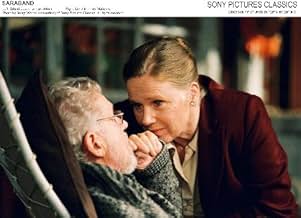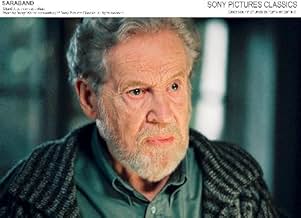Marianne, some thirty years after divorcing Johan, decides to visit her ex-husband at his summer home. She arrives in the middle of a family drama between Johan's son from another marriage a... Read allMarianne, some thirty years after divorcing Johan, decides to visit her ex-husband at his summer home. She arrives in the middle of a family drama between Johan's son from another marriage and his granddaughter.Marianne, some thirty years after divorcing Johan, decides to visit her ex-husband at his summer home. She arrives in the middle of a family drama between Johan's son from another marriage and his granddaughter.
- Awards
- 3 wins & 3 nominations total
- Director
- Writer
- All cast & crew
- Production, box office & more at IMDbPro
Featured reviews
"Saraband" for me is about as good as he gets...and that's high praise. Here the human soul in anguish is laid bare in all its honest need...a thwarted one...for love and understanding. A once married couple, Marianne and Johann (brilliantly portrayed by Liv Ullmann and Erland Josephson) do their saraband even after 30 years apart. And like that dance, in its repetitive themes, their relationship as well as that of Johann's son and granddaughter form a kind of tragic rondo, sadly and inexorably replicated. Henrik, the 61 year old son (portrayed with amazing profoundity by Borje Ahlstedt) cannot extricate himself from the slings and arrows aimed at him continually by his father. The one character, now dead, who serves as a graceful inspiration to them all is Henrik's wife and his daughter, Karin's mother...Anna. We see her beautiful face in a photographic portrait, but her loving presence in their memory is so strong it becomes a kind of living influence. Karin, played by the stunning Julia Dufvenius, is also the victim of the family dynamic and forms the important fourth in this saraband of life and fate.
It may be too easy to compare and contrast this film and the series. But it is of interest if only for curiosity sake. There is something of note that revealed to one how the actual cinematography can evolve properly or at least in a fashion that is not off-putting. This time around (unlike Sven Nykvist's perfect work on 'Marriage', a kind of pre-Dogma 95 style to use the camera with the story), Bergman decided to make the film for television (his on occasion work aside from theatre for the past twenty years since Fanny and Alexander) and also decided to implement digital photography. There are five cinematographers, and it's too tedious to pick out if which one did what properly or who lit this right and so on. But that in Saraband, however, doesn't suffer by way of the digital perspective. If anything, it serves its purpose fully by keeping the naturalistic mood. Some scenes are seen with as clear an eye as ever for Bergman. Others that may be a little more obscured by darkness are affecting psychologically in a way. Bergman's preference is to look at faces and expressions, without much to obscure the actors.
What is of surprise is that Bergman injects two things that he intentionally kept out of 'Scenes'- inner visions (actually shown, not just spoken and felt by the actors), and music. In at least a couple of scenes, to add an intensity and a sense of the surreal, we see what Karina sees in some key moments. She describes an ugly incident with her father. She runs through the woods. When something very ugly occurs, it happens off screen, with a pause given in-between one scream. Needless to say it was tremendously moving. The other involved an enormous, involving fantasy. She's just been told information by her grandfather Johan that is crucial for her decision towards the end. When she sits on the stairs, the camera suddenly cuts to pull back on her on a chair, against a white background, and the camera pulls back further and further at a quick pace. This kind of technique I could feel as if I've seen in maybe a dozen films. When Bergman does this, after such a hopeful scene for Karina, it is a useful technique. Whatever the intention, it's far greater a grab then in a standard action film. Those are the two kinds of scenes/images that are very emotional and immediate on a first viewing.
Ullmann and Josephson, who portrayed Marianne and Johan thirty years ago, never lose their ability to play off each other as actors. The focal point this time is with Henrik and Karina though, so the performances by Ahlstedt and especially Dufvenius for Bergman had to be even more affecting than those of the observers. Ahlstedt's Henrik is a tricky sort to empathize with perhaps: can an audience be with him when the drama unfolds with his daughter? Turns out he brings the humanity in all its darkness and seemingly complex inner-damnation as one of Bergman's most memorable characters. His conflicts with his father and daughter stem from a number of elements, but the key one is very identifiable- death of the one you've loved the most. How can change occur? This is a question posed as well for Karina, and in Ahlstedt playing her she already shows enough talent and gusto to take on stronger roles in the future. At first sight, I thought she might have been over-hitting her mark, or that Bergman was over-directing. This was not the case, and in the subtle moments she revealed herself on the level of one of Bergman's 'ladies' (i.e. Ullmann, Bibi Andersson, and Harriet Anderson).
As the closure, what does Bergman do? He does something rather wise to weave the story of the father and daughter together with the continuing story of Johan and Marianne with an equal resonance and emotional weight. The younger two find their own ends to the means, and I would not dare reveal how and why. But for Marianne Bergman answers a question that was asked if not out-right then with all of the action and tension and buildups and payoffs in 'Marriage'. Does a person know what emotion is, or what it feels like? In the final scene (to put it mildly), he and Ullmann answer it in an approach that practically had me in tears. This would not mark the first time this has happened while viewing a Bergman film, yet the fact that this is the last gave me a cleansing feeling, of the greatest cathartic release with a thoughtful film.
If it's one of the key objectives for a filmmaker in drama and tragedy to reveal it as truthfully as possible, and bring us with the character(s) full-circle, Ingmar Bergman's pulled it off wonderfully. Saraband is one of the crucial swan songs in film history (for my money, and will soon find its way to American theaters (digital projectors more or less likely). A++
Having said that it seems a strange twist of fate to be viewing Saraband, as I did, at the Edinburgh International Film Festival where it is up for the Standard Life 'audience award', along with mainstream crowd-pleasers. As I cast my vote I felt it was almost a desecration for such a movie to be entered in a popularity poll, however discerning the audience. There are a number of serious works at the Festival and they should be judged by an independent panel of experts - there is a discussion afoot to create a new award along these lines - otherwise it is like comparing Beethoven with the Beatles.
Saraband, in true Bergman tradition, wrestles with human relationships, using a slow pace, pointed dialogue, and heavy use of symbolism to explore the psychological states of the characters. Bergman encourages young directors not to direct any film that does not have a "message," but to wait until one comes along that does, yet admits himself that he is not always sure of the message of some of his films.
We are never in any doubt that this film has much point to it, even if the point is not exactly clear. It opens with the slow soulful 'saraband', of Bach's 5th unaccompanied cello suite. 'Sarabande' is one of the movements from the suite, a slow and, compared to the others, a relatively easy piece to play. Marianne (Liv Ullman), is both narrator (at the beginning and end of the film) and principal protagonist. As she walks through the rooms of a house the doors close behind her. A cuckoo clock strikes. She is in the later part of her life. She fleetingly touches the keys of a piano, as if to say she still, even in solitude, has her inner music. Her presence is explained as she goes to the veranda and we find she is visiting an ex-husband, someone who was unfaithful to her many years ago. The colours are crisp and sharp. Of all the members of her family, Marianne is perhaps the clearest of mind and most well-balanced, but it is the extended interaction (with very little action) between the main players that give us insights into the beauty of being elderly, at least for someone like Marianne who handles it well. Yet even she is filled with sadness for others.
Later chapters of the film focus on her step-grand-daughter. Karin is a cellist, living with a rather overprotective (if that's not too mild a word) father, also a musician. She has to face a difficult choice, involving her personal loyalties, her loyalty to herself and ability as a gifted young cellist, and the need to extricate herself from a situation that is bad for her but will be bad for her father if she does.
The symbolism of the title and music neatly metaphors the decisions before her. A saraband is also a two-person dance. The suggestion, made at one point, of playing it by two people alternating is essentially a frivolous one, which serious musicians would probably reject. That the Suite for Unaccompanied Cello should not be played as a duet, even with the younger person playing the 'easier part' as Karin's father suggests, is an unobtrusive symbol reminding us, in the film's later loaded context, that there are some lines that an older and younger person should never cross together.
Saraband shows how old age can tempt us to wisdom or its opposite.
With an intolerable burden of the generations, a young woman must make a choice that may be tragic. There are no useful models, not even the briefly glimpsed folk-art carving of the Last Supper with John, the beloved disciple, blissful on the lap of Jesus, not law, Kierkegaard, whiskey, or Bach either.
It is regrettable if after all these years this is Bergman's "Tempest" (though then appropriately involving Erland Josephson--all the actors are necessarily extremely good). Shakespeare did go on to work on "The Two Noble Kinsman."
SVT could have given Bergman film instead of digital recording. RAI uses film for its splendid productions, or it used to. Seen in a theatre, the visual quality was imperfect. How could people think this work would not deserve general theatrical release?
Now, over 30 years later, I am in my living room once more watching Johan and Marianne. Only this time I don't need subtitles, as I have since learnt Swedish. :-)
Bergman weaves a tale of vindictive dependence and of a young girl's decision to finally make her own way in life - despite some very powerful forces preventing such a move.
Marianne decides to seek out Johan, meets him and becomes involved in the tug of war over his grand-daughter's future with the girl's father, Johan's depressed son Henrik (wonderfully played by Börje Ahlstedt).
A quiet, intensive film. With an important, pivotal roll for the grand-daughter Karin played by Julia Dufvenius.
Bergman should be proud of this. It's a fine epilogue to a marvelous career in cinema and story-telling.
Bravo!
Did you know
- TriviaThe film is very autobiographical. The character of Anna is actually Ingrid von Rosen, Ingmar Bergman's wife, who died of cancer, and was his greatest love. The photography of Anna used in the film is also of Ingrid. The movie is also dedicated "to Ingrid", as stated in the opening title screen.
- GoofsThere are some interesting discrepancies in relation to the time line of the characters. The ages given for the characters are 63 (Marianne), 86 (Johan) and 61 (Henrik). Marianne says that she has not seen Johan for 32 years and that they had been married for 16 years. This means that she married Johan when she was 15 and he was 38. Johan had a falling out with his son when Henrik was 18/19, which must have been after Johan's marriage to Marianne.
- Quotes
Henrik: Dad, where does all this hostility come from?
Johan: Speak for yourself. When you were 18 or 19, I tried to get close to you. You'd been seriously ill, and your mother wanted us to talk things out. I said to you, "I know I've been a bad father, and I want to do better." And you screamed at me--yes, screamed--"A bad father? You've never been a father at all!" Then you said you could do without my forced exertions. One should respect honest hatred, and I respect yours. But I really couldn't care less if you hate me. You barely exist. If it weren't for Karin, who thank God takes after her mother, you wouldn't exist for me at all. So there's no hostility here, I assure you.
- ConnectionsFeatured in Bergman och filmen, Bergman och teatern, Bergman och Fårö (2004)
- SoundtracksCello Suite no. 5 in C Minor, Movement 4: Saraband
Composed by Johann Sebastian Bach
Performed by Torleif Thedeen (as Thorleif Thedeen)
- How long is Saraband?Powered by Alexa
Details
Box office
- Gross US & Canada
- $645,634
- Opening weekend US & Canada
- $34,304
- Jul 10, 2005
- Gross worldwide
- $975,181
- Runtime1 hour 47 minutes
- Color
- Sound mix
Contribute to this page





